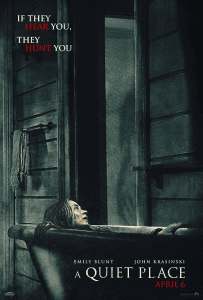By Christian Hamaker
How many times have you told your kids to be quiet? If you’re like me, you’ve lost count. But you’ve also yielded, with time, to a certain level of noise that, in your single days, you might never have thought you’d put up with.
We live with ambient noise all day long. If we’re not watching TV or listening to music, there’s something playing in the background, in the office next door, or even in the apartment on the other side of the wall.
It’s hard to escape noise in the office, or on the road, so when you’re home, maybe you just want some peace and quiet. But those darn kids just. Won’t. Pipe. Down!
A Quiet Place, the new film from John Krasinski (Jim from NBC’s The Office), posits a potentially relaxing reality: A world where no one—kids especially—makes a sound. But that reality is hard to sustain, especially when you live with young children.
As the story begins, we’re told though on-screen text that we’re in the middle of “Day 89.” (Of what is not yet revealed.) We meet the Abbot family—Krasinski’s patriarch, Lee; his wife, Evelyn (Emily Blunt, to whom Krasinski is married in real life); their deaf daughter, Regan (Millicent Simmonds); and son, Marcus (Noah Jupe). The kids play nearly silently. No one speaks audibly; instead they gesture or use sign language. When a child knocks an item off a shelf, it’s caught by a diving parent just before the object hits the floor—much to the obvious relief of all involved.

What’s going on? Why is everyone so … quiet? (The film’s rules allow for audible communication when drowned out by other, louder sounds. We also hear a song to which the husband and wife dance, as they listen to music via shared earbuds.)
The answer comes soon enough, as the film flashes forward to Day 472 and visible newspaper headlines literally spell out the details of the crisis. But to discuss the situation in detail here would be, in a sense, a spoiler, so I’m constrained in what I can—or should—say about the dire straits faced by the Abbots. Other reviews and, perhaps, TV spots may give away the adversary the family is facing, as well as the reasons why they must never utter anything audible. However, I’ll let the surprise unfold for readers the way it unfolded for me—with a sense of shock and some amount of awe. Suffice it to say that the enemy is otherworldly and seeming unconquerable.
The reasons why sound is a trigger for grisly consequences is never explained. We live through the family’s terror, rooting for them to somehow overcome their foe. With no dialogue to explain things, the terror is served up at a very primal level, with young kids in jeopardy, a scene of childbirth that must somehow unfold without audible childbirth pains or cries. Shots of a nail jutting from a wooden step as a character descends the staircase induce dread. There’s not much depth here, but anyone, especially parents, will respond to the survival instincts of the Abbots and to the father and mother’s deep love for their children. “What are we if we can’t protect them?” the wife asks her husband late in the film. “Promise me you will protect them.”
Thanks to the quickly established gravity of the situation, an early and effective shock sequence, and the strong screen presence of the adult and child actors, A Quiet Place is a gripping 90 minutes of mostly silent cinema. In a world of noisy blockbusters, the film stands out with an approach that demonstrates how less can be more.
But perhaps the biggest surprise is the film’s effect on its viewers. To watch A Quiet Place with an audience is to be reminded that some films still have the power to make viewers sit rapt, leave their phones in their pockets and gasp in surprise. It’s the best communal experience I’ve had at the cinema in some time. If such things matter to you, be sure to see A Quiet Place at the theater rather than wait for its home-video release. Unlike the film’s protagonists, you’ll want to talk about it out loud—and you won’t suffer any negative consequences.











